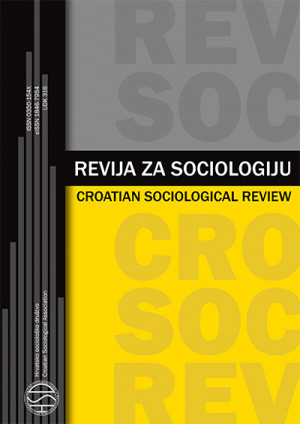Oblici roditeljskoga glazbenog kulturnog kapitala i glazbena socijalizacija djece rane i predškolske dobi
Forms of Parental Musical Cultural Capital and Musical Socialisation of Early and Preschool Age Children
Author(s): Željko Boneta, Akvilina Čamber Tambolaš, Željka IvkovićSubject(s): Music, Preschool education, Family and social welfare, Sociology of Culture, Social Norms / Social Control, Sociology of Education
Published by: Hrvatsko sociološko društvo
Keywords: parental musical cultural capital; children’s musical socialisation; em¬bodied musical cultural capital; objectified musical cultural capital; institutional¬ised musical cultural capital;
Summary/Abstract: Sociological research of the intergenerational transmission of cultural capital, inspired by Bourdieuʼs theory of cultural reproduction, has been frequent since the 1990s. The focus was typically put on the analyses of the influence of parental cultural capital on school-age children. This article examined the relationship be¬tween parental musical cultural capital and musical socialisation of the age group which has been overlooked in the previous research – children of early and preschool age. Bourdieuʼs thesis of three forms of cultural capital is operationalised in the field of music. While parents’ general and musical education were used as indicators of parents’ institutionalised musical cultural capital, parents’ and children’s musical engagement and parental musical education practice served as indicators of the embodied musical cultural capital. Family material musical resources used in the process of musical socialisation were utilised as indicators of the objectified musical cultural capital. The survey was conducted in 2013 on a sample of parents whose children attended kindergartens in the Croatian city of Rijeka (N = 342). In most families, the practice of performing musi¬cal activities with children and the possession of musical resources that enable these activities were frequent, but the children’s involvement in extracurricular music activities outside the kindergarten was very limited. Weak associations were found between parental education (general and musical), forms of parental musical educational practices and the possession of material musical resources. The transmission of the musical cultural capital was somewhat more strongly associated with the musical education of parents and the past or current parental musical engagement than with parental general education. In conclusion, musical socialisation of the children of that age does not have, in Bourdieuʼs sense, a distinctive function in the transmission of cultural capital. Instead, it takes place within the gendered pattern of care for the children of early and preschool age, where the mother is more engaged in all dimensions of (musical) socialisation than the father.
Journal: Revija za sociologiju
- Issue Year: 47/2017
- Issue No: 1
- Page Range: 5-36
- Page Count: 32
- Language: Croatian

